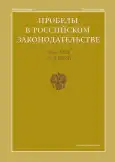Forensic Examination of Firearms Manufactured by Additive Manufacturing (3D Printing): Innovations in Forensic Ballistics
- 作者: Lozinsky O.I.1
-
隶属关系:
- South Russian Institute of Management – Branch of the Russian Presidential Academy of National Economy and Public Administration
- 期: 卷 17, 编号 5 (2024)
- 页面: 100-107
- 栏目: Criminal Law Sciences
- URL: https://journal-vniispk.ru/2072-3164/article/view/265987
- EDN: https://elibrary.ru/LOUBHG
- ID: 265987
如何引用文章
详细
The purpose of the study. The article analyzes the forensic characteristics of firearms, cartridges (ammunition) for them, innovations in forensic ballistic examination for the study of weapons and cartridges manufactured by additive manufacturing (3D printing). Conclusions. Currently, the most innovative type of handguns (produced en masse) is a weapon manufactured by additive manufacturing (3D printing), which is constantly being improved, becoming more and more efficient and reliable, and the range of its types and production volume have a constant tendency to expand and grow. Innovations in the field of forensic ballistic examination, based on a specialized methodological base and the results of, albeit not very significant, but still existing, empirical experience in expert research of this type, serve to organize significant counteraction to criminal forms of use of this type of weapon. Firearms (in all its diversity) remain one of the most applicable means of criminal elements to realize their criminal intentions (which is manifested in its constant innovations, both in relation to samples of mass factory production, and, in particular, in relation to samples of small-scale, narrow-profile production).
作者简介
Oleg Lozinsky
South Russian Institute of Management – Branch of the Russian Presidential Academy of National Economy and Public Administration
编辑信件的主要联系方式.
Email: oleg.lozz@yandex.ru
SPIN 代码: 3389-3371
Cand.Sci.(Law), Associate professor of the Procedural Law Department
俄罗斯联邦, Rostov-on-Don参考
- Anokhina E.A. Forensic ballistic examination: problematic issues and ways to solve them // Bulletin of the Kuzbass Institute. 2023. № 4. Pp. 119-123.
- Aitmagombetov M.U. Forensic ballistic examination of firearms: factory, artisanal, homemade, atypical // Bulletin of Kemerovo State University. 2022. No. 1. pp. 124-127.
- Balashov A.M. Classification of cartridges for firearms: types, bases, atypical cases of picking // Legal science and practice. 2022. No. 5. pp. 79-83.
- Borsakh A.V. Forensic investigation of the 9-mm pistol "Glock-17" // Bulletin of the Siberian Institute of the Ministry of Internal Affairs of Russia. 2023. No. 1. pp. 89-93.
- Bessonov S.Y. Forensic ballistic examination of various types of firearms: the most typical solvable issues // Philosophy of Law. 2022. No. 3. pp. 76-82.
- Bardachenko A.N. Forensic characteristics of the BERETTA 92FS 9 mm pistol // Bulletin of the Belgorod State University. 2023. No. 2. pp. 103-109.
- Vekshina O.P. Ballistic research of firearms: design and energy parameters, determination of the degree of functional reliability and safety for the shooter // Issues of Russian justice. 2022. No. 5. pp. 39-46.
- Voropaev S.N. Forensic ballistic examination as a source of objective evidence in criminal cases // Scientific journal "Legal fact". 2023. No. 1. pp. 113-117.
- Gaeva O.V. Forensic ballistic examination of homemade firearms: specifics; problematic issues; ways to resolve them // Problems of law: theory and practice. 2023. No. 4. pp. 137-143.
- Hoffman S.S. Objects of forensic research of forensic ballistic examination: types; resolved issues // Criminalistics: yesterday, today, tomorrow. 2022. No. 4. pp. 51-57.
- Evdokimov N.R. Terminal ballistic investigation of bullets for a smoothbore hunting rifle // Technique of the XXI century through the eyes of young scientists and specialists. 2022. No. 3. pp. 184-189.
- Zubenko E.V. Problems of expert research of weapons manufactured by the additive manufacturing method // High-tech law: genesis and prospects. 2023. No. 2. pp. 127-131.
- Kalyuzhny A.P. Weapons printed on a 3D printer: concept, types, technological process and production algorithms // Synthesis of science and society in solving global problems. 2023. No. 5. pp. 63-69.
- Plyasova K.A. Criminalistic characteristics of weapons manufactured by additive manufacturing (printed on a 3D printer) // International Scientific and Practical Journal. 2023. No. 1. pp. 139-143.
- Tregubova E.M. Forensic ballistic examination of weapons manufactured by the additive manufacturing method // Legal research. 2024. No. 1. pp. 209-216.
- Sheveleva A.A. Forensic ballistic examination of firearms and ammunition // Eurasian Law Journal. 2023. № 4. Pp. 104-109.
- Yaremchuk V.P. Correlation of forensic technology with branches of scientific knowledge providing organization and production of forensic ballistic examinations // Bulletin of the Vladimir Law Institute. 2024. No. 2. pp. 107-111.
补充文件








